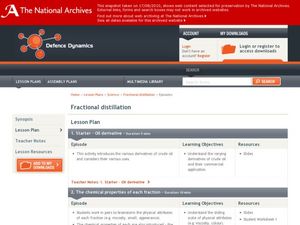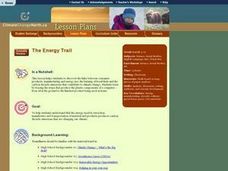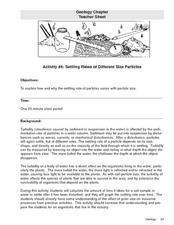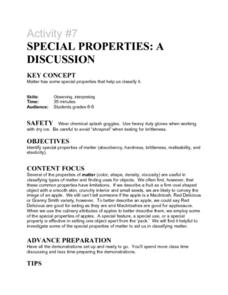Curated OER
Oil and its Everyday Uses
Explore the properties of oil through an experiment. They use the scientific process to investigate oil, participate in experiments, watch videos,and use information from the internet to determine how oil has changed our everyday lives.
Curated OER
Fractional Distillation
Students brainstorm the different uses of petroleum distillates. In this chemistry lesson plan, students explain the process of fractional distillation. They analyze the impact of oil extraction to the environment.
Curated OER
THE WONDERFUL WATER CYCLE
Learners are introduced to the processes of evaporation and condensation as they observe physical changes in water. They observe how matter changes from a solid to a liquid state. Students are explained that steam is water in its gaseous...
Curated OER
Are We Falling Apart? Exploding Volcanoes
Students research and demonstrate volcanic activity. In this volcanism lesson plan, students research the types of volcanoes and define related terms using the Internet. They demonstrate volcanic activity with water, corn syrup, and flour.
Curated OER
A Comparison of Polymeric Liquids with Newtonian Liquids
Young scholars perform several tests on liquids. In this general science lesson, students compare the properties of polymeric and nonpolymeric liquids. They explain the composition and importance of macromolecules.
Curated OER
A Natural Habitat: What, How and Why
Students understand what a habitat is. They determine why a habitat is important to our environment no matter where it is located. Students observe and recognize natural habitats in their surroundings.
Curated OER
Alternative Energy
Students discover the different alternative fuel sources. In this biology lesson plan, students identify the different stages of the carbon cycle. They explain the pros and cons of using alternative energy.
Curated OER
Applying Scientific Method to Analyzing
Students review the scientific method and basic lab skills, and practice how chemical employees work in teams to follow the scientific method. Students learn about various job requirements and responsibilities in the chemical industry.
Curated OER
HOW FAST DO SEDIMENT GRAINS OF DIFFERENT SIZES SETTLE?
Students conduct an experiment using sand, a jar, and a paper clip to analyze the effects of different kinds of sand vis a vis its sediment. They graph their findings and analyze for factors of size, shape, and density.
Curated OER
The Energy Trail
Students examine the relationship between the products they use and energy use. Using the internet, they identify the role that manufacturing plays in using energy and the emissions that change the climate. They discover the steps to...
Curated OER
Are We Falling Apart? Exploding Volcanoes
Students explore how volcanoes are formed, list the parts and characteristics of volcanoes, state the differences in various types of lava, and analyze the volume of ejecta from a volcano.
Curated OER
Laboratory - Density of a Material
Middle schoolers conduct a lab (with water, guar gum and sodium borate) and carefully record physical and chemical properties and changes throughout the session, and experiment with weighing by difference.
Curated OER
DNA the Easy Way (and "Gram Stain" Without the Mess)
Students visualize DNA from cells and explain the basis and importance of the Gram-stain reaction and to perform the KOH test equivalent.
Curated OER
Settling Rates of Different Size Particles
Students discover how and why the settling rate of particles differs with the size of the particles. Using different soil samples, they calculate the amount of time it takes for a sample to settle in water for up to forty minutes. They...
Curated OER
Educator's Tools: Biodiesel Lesson
Students are able to determine whom Rudolf Diesel was. They discover that biodiesel is a renewable fuel. Students can define what renewable means. They get a clear usable defintion of what triglycerides are. Students get to see how...
Curated OER
Activity #7 Special Properties: A Discussion
Students identify special properties of matter (absorbency, hardness, brittleness, malleability, and elasticity). They define the term matter. Pupils investigate some of the special properties of matter to aid in classifying matter.
Other popular searches
- Viscosity and Magma
- Viscosity of Fluids
- Viscosity Labs
- Viscosity Oflava and Magma
- Viscosity and Volcanoes
- Viscosity of Liquids
- Lava Viscosity
- Oobleck Viscosity
- Lava Flow and Viscosity
- Volcanoes Viscosity
- Viscosity of Lava and Magma
- Viscosity. Oil and Water



